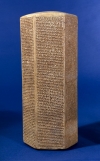
The biblical Book of James is full of wisdom and is regularly quoted by ministers preaching against gossip – the section on 'taming the tongue' in chapter three is powerful stuff.
But many people know Martin Luther's opinion of the book, or think they do, and wonder whether James is really to be placed on the same level as the Gospels or Paul's letters.
He famously described James as "an epistle of straw", because it talked about law and good deeds rather than faith, the keystone of Luther's theology: "You see that a person is justified by what he does and not by faith alone" (James 2:24).
Luther wrote that John's Gospel and his first letter, Paul's letters and Peter's first letter "are the books that show you Christ and teach you all that is necessary and salvatory for you to know, even if you were never to see or hear any other book or doctrine".
James, however, he thinks "is really an epistle of straw, compared to these others, for it has nothing of the nature of the gospel about it".
But does that mean he didn't think it was any good? No: in his preface to the book, he says: "I praise it and consider it a good book, because it sets up no doctrines of men but vigorously promulgates the law of God."
On the other hand, Luther doesn't think the author was an apostle. Instead he "must have been some good, pious man, who took a few sayings from the disciples of the apostles and thus tossed them off on paper". The author, he believes, "wanted to guard against those who relied on faith without works, but was unequal to the task". Luther says he "cannot include him among the chief books, though I would not thereby prevent anyone from including or extolling him as he pleases, for there are otherwise many good sayings in him".
It's been suggested that Luther wasn't arguing that James shouldn't be in the Bible, just that it wasn't as useful as other books. It's generally accepted, though, that he wanted to exclude Hebrews, James, Jude and Revelation. He thought they weren't accepted universally by the early Church and they didn't stress the need for faith enough.
But it's worth saying Luther wasn't alone in questioning the authorship of James. Other scholars did as well, both Reformed and Catholic. Furthermore, he took out the 'epistle of straw' reference from later editions of his Preface to the New Testament, indicating he thought he'd gone too far. And he never says James isn't worth reading – he just didn't think it was Scripture.
There are three things about Luther and James that might interest us today.
First, Christians overwhelmingly believe the book ought to be in the Bible. But knowing that such a great scholar questioned it opens a fascinating window on to how we came to have our Scriptures and the complicated history of Church councils and synods that defined them.
Second, it sends us back to the core of our beliefs: that God was in Christ, reconciling the world to himself, and that salvation is by grace through faith. It's quite right to major on these themes in our reading and preaching, and to test Scripture against these doctrines. All Scripture is inspired, but – as Luther says – all Scripture isn't equally useful.
Third, it sends us back to James to find out what made the early Church fathers believe it was scriptural or 'canonical'. And it has wonderfully practical advice about how to live the Christian life. James stops us from thinking what we do doesn't matter as long as we believe the right things. It matters very much.
Follow Mark Woods on Twitter: @RevMarkWoods

















